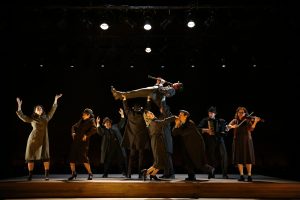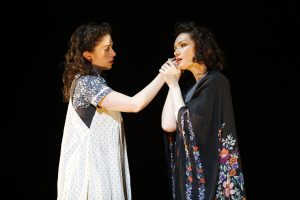Is ‘The God of Vengeance’ ‘Indecent’? La Jolla Playhouse Wrestles With the Legend
Indecent, opening a new season at La Jolla Playhouse, is a splendid production of an intriguing jumble of history, literature, conjecture and interpretation surrounding The God of Vengeance, an impressive European drama from the early 20th Century mainly known now because it included the first lesbian kiss in a Broadway show.
That’s like remembering Alexander the Great because he was queer. God of Vengeance seems a sensitive, layered, even heart-warming play, which I must get around to reading. Not for the eroticism – which clearly is present – but because it’s a hitherto unknown (to me) part of the golden age of European theatre, when Ibsen, Shaw, Strindberg and Chekov were revolutionizing the drama.
Meanwhile, though, there is a filmy underbrush of irony, misunderstanding, intolerance and obstinate intolerance that has built up around the play in the years since 1905, when it first was performed in Berlin. Rebecca Taichman, the triumphant director of Indecent, apparently has been rummaging through this stuff for nearly 20 years, since her Yale days, and the complex texture assembled by author Paul Vogel, is both a joy and a load.
Sholem Asch, a respected novelist who wrote in Yiddish, was warned by fellow intellectual Polish Jews not to force God of Vengeance on the wider world as possible fuel for the growing anti-Semite undertones in Europe. After its premiere, though, it became quite successful, eventually translated into 10 languages and widely produced as part of revolutions both intellectual and ethnic. It was only when it reached America that the trouble began, from an unexpected source: fellow Jews.
In the play, the operator of a brothel has raised his daughter in the family quarters upstairs to be pure and innocent. There is even talk of marrying her to a rabbinical student. But the girl, meanwhile, has discovered the secret of downstairs and fallen in love with one of the whores. In a rainy, poetical climax to Act II, their rampaging mutual ardor climaxes with a passionate kiss and they flee together.
In the last act, the father finds her and confronts her with the question of her virginity. As she stumbles over an answer, he drags her to the stairway and thrusts her down toward the brothel, lifting the sacred Torah to throw after her as the curtain falls.
Strong stuff, even now. It’s as hard to picture this becoming such a European success as it is to imagine any set of circumstances that would have landed it on Broadway in 1922, along with Merton of the Movies, Six Cylinder Love and Little Nellie Kelly. But there, on the evening of Feb. 19, 1923, it was, transferred from the Provincetown Playhouse in Greenwich in its first English-language production. A couple of weeks later, a vice squad cop showed up just before the end of Act II and, after the show, arrested the actors, their manager and the theatre owner.
A jury found them all guilty but everybody got suspended sentences except for the producer and director, who were fined $300 each. (The cast, by the way, included Sam Jaffe and Morris Carnovsky, two of the most important American actors to come out of the Yiddish theatre.)
But here’s the strangest thing: Not one bit of the press coverage I’ve seen even mentioned the actresses’ kiss. Instead, the conviction seemed to center on the mistreatment of the holy Torah, an irony of considerable proportion itself. There had been changes made to Asch’s text and he didn’t object. Somebody in Indecent notes that the changes removed the love and left the sex. Sounds all too likely.
And the citizen’s complaint that finally brought the cops to the Apollo Theatre came from, according to various sources, the Jewish community itself. A New York paper, the Jewish Daily Record, commented: “The entire pogrom…comes from …American Jews, who are up to date with their suits and dresses but not with their understanding. They belong to the generation which believes that the highest duty of literature is to hide the truth.”
Meanwhile, Burns Mantle, the uptown critic who edited the annual “Best Plays of 1922-1923,” observed primly that the court case, “…put a fear of the law in the hearts of several other producers given to taking chances with plays of questionable character.”
Well, the theatre has survived and flourished to the point that a feast like Indecent is possible in a mainstream production. Vogel and Taichman have fashioned an imposing edifice from such widely scattered sources as Fred Astaire singing, Ellis Island agonies, Eugene O’Neill ruminating and a Holocaust death camp to follow those two girls in the rain from then till (nearly) now.
They use a company of seven actors and three musicians, working together like a family of acrobats. Adina Verson plays the innocent girls and Katrina Lenk, the mature temptresses, with tender respect and they both also join the band as needed. Mimi Lieber does the moms, Max Gordon More handles the young men and Steven Rattazzi does comic (and not so comic) character bits.
Richard Topol stays mainly with the character of a true believer in the play from its first reading to its Broadway bust, growing and maturing in a single arc denied the others. And Tom Nelis, poised and moving wondrously, plays stern authority and subtle whimsy with equal ease.
The three musicians – violinist Lisa Gutkin, Aaron Halva on mostly accordion and Travis W. Hendrix, covering clarinet, bowed bass, guitar plus maybe others – collaborated on the klezmer-flavored score including, apparently, a couple of generic show tunes. With the music a constant presence and David Dorfman’s pungent choreography always waiting to break out, the show floats across vast spans of space and time with elegant ease.
Nobody’s ever offstage for long since this is a dark, minimal set (Riccardo Hernandez) defined deftly by lighting elements (Christopher Akerlind) as both illumination and scene-setting. Emily Rebholz’s costumes are as period as all get-out and the projected translations, though sometimes washed out by other lights, are thoughtful augmentations (credit Tal Yarden and Keith Skretch) that allow bold Yiddish script to dominate the scene.
Indecent leaves an audience with so much to process that reactions probably vary all over the spectrum. Asch doesn’t come out nearly as well as his play, in my opinion. His poetry successfully floated his message but some of his statements about the American mess sound naive. And his indifference to script tinkering, blamed here at least partly on his shyness with English, raises questions.
Vogel and Taichman suggest an agenda in their choices dealing with the lesbian angles of the story. More specifics might help. It’s fine to have a 1922 protestor laying on the sarcasm about some distant future day when women can actually marry but one wonders if there’s any record on anybody actually saying that and how.
It’s too bad there’s not a way to know the Asch play before encountering this one. From the generous peeps offered, it sounds like something worth spending a few years on.
Continues in the Mandell Weiss Theatre at 7:30 p.m. Tuesdays and Wednesdays; 8 p.m. Thursdays-Saturday; 2 p.m. Saturdays and Sundays; and 7 p.m. Sundays through Dec. 10, 2015.




